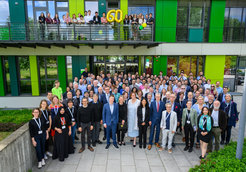60th anniversary of the MPIMG
A look back at the celebrations

Anniversaries and birthdays have much in common: they are occasions to celebrate, to look back and to look forward, usually among friends with whom you share not only the past but also the future. All of this was true for our 60th anniversary at the end of May. We began with a symposium filled to the brim with fascinating science, opened by Asifa Akhtar, Vice-President of the Biology & Medicine Section of the Max Planck Society. Notably, many of the speakers were alumni, reminiscing about their time at MPIMG, but their presence also highlighted the Institute's extensive academic network.
An outlook for Science in Berlin
On the second day, we were very happy to welcome Max Planck Society President Patrick Cramer. In his speech, he reflected on the rich history of the Institute and reiterated his support for our continued growth and development. In particular, he thanked everyone at the Institute, both scientific and non-scientific staff, for their hard work and stressed the importance of continued collaboration within the Institute. We were also joined by Ina Czyborra, Senator for Science, Health and Care of the City of Berlin, and Judith Pirscher, State Secretary of the Federal Ministry of Education and Research, who emphasized the central role of the MPIMG in Berlin's and Germany's scientific community. The event concluded with a roundtable discussion on the future of science in Berlin and an outlook by Director Alexander Meissner.
Farewells and new prizes
Another highlight was the farewell talk by our former director Bernard Herrmann, who was honored for his contributions to the MPIMG with the Lifetime Achievement Award presented by State Secretary Judith Pirscher. The event also marked the first presentation of the Major Groove Award to Alessa Ringel of the Mundlos Lab. The award, named after an important structural feature of DNA, reflects the mission and identity of the Institute and is given annually to a graduate student at MPIMG for outstanding effort, character, contributions, or service to the community beyond excellent and exemplary research. The event entailed also a social and cultural program with “Elevating Science Art”, research images projected onto the elevator wall in the lobby, swing music from the string duo Nidaš and a reception for all participa. In total, 290 people attended the meeting in person and 30 online. Participants were from the science community in Berlin and worldwide but also many colleagues from non-scientific areas of our institute showed great interest in the event.
We thank all colleagues who contributed to this great event. We are looking forward to the next 60 years with you!












